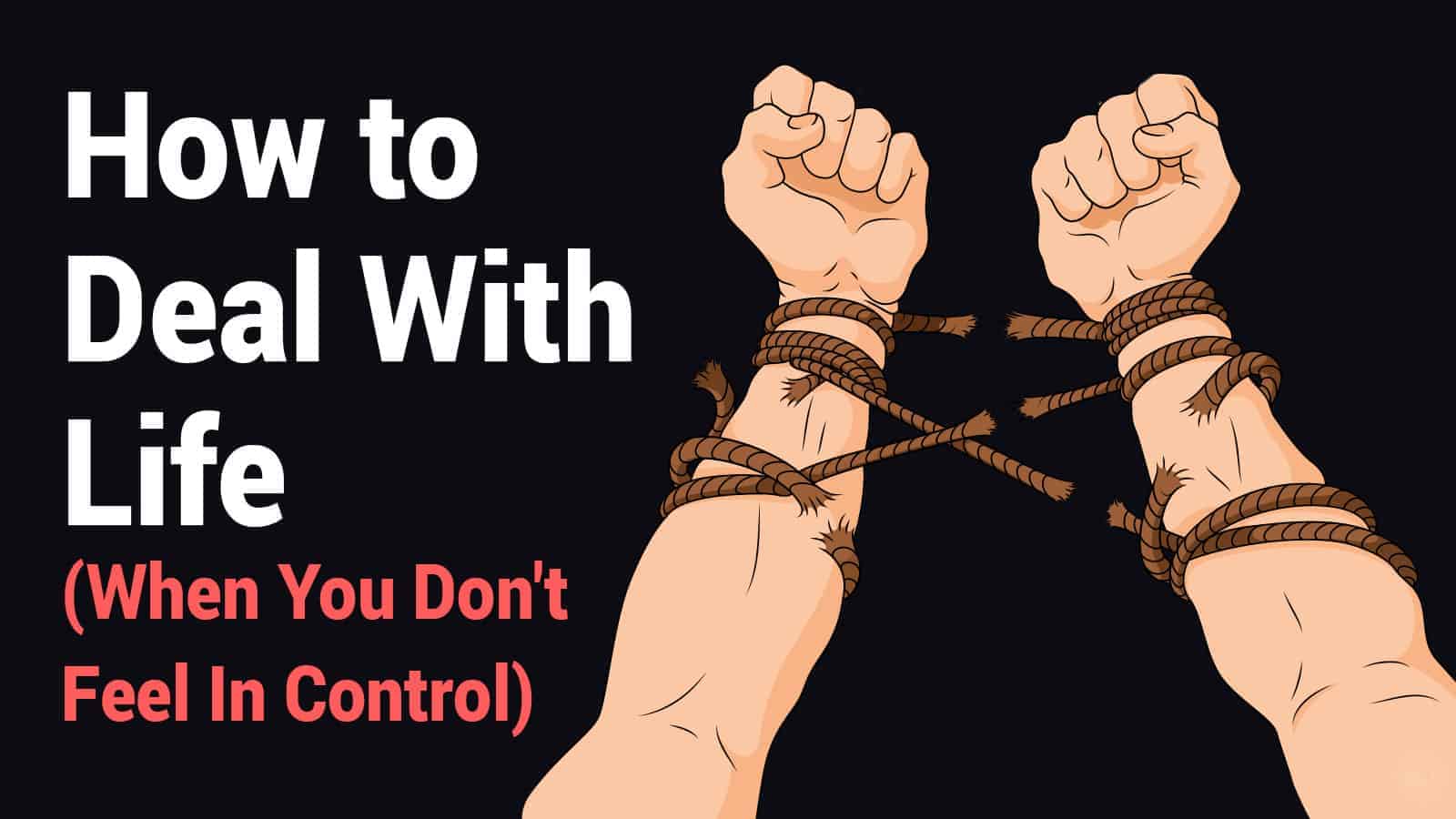Do you sometimes feel that you have little control over your life?
Life has its ups and downs, and it is often unpredictable, full of unexpected twists and turns that frighten, shock, and confuse us. It can all seem very overwhelming, like a confounding and disorienting path that spins you around in circles.
It’s no surprise that, given the nature of life, people feel like they have no control. These feelings can fester and morph into much more complicated emotions, so understand and curbing them is crucial.
Here’s How To Deal With Life When You Don’t Feel In Control
1. Acknowledge The Things You Have No Control Over
It’s impossible to control every single aspect of the world and your life. No matter what, there are some things that you simply can’t influence. Unfortunately, when you already feel like nothing’s in your control, this additional stress can make it difficult to function.
To help overcome these hurdles, start by making a list of things that you absolutely have zero control over. Examples include:
- Traffic
- The economy
- The moods of those around you
- The weather
- Delayed public transportation
It seems counterproductive, but having a definitive idea of things you cannot control at all can help you move past them. Once you have your list, say, “So these are the things I can’t change. But what can I change?”
This helps you refocus on what you can help, and it shifts power back into your hands, with your energies concentrated on productivity as opposed to failed attempts. So, the next time something negative happens to you, immediately shift your focus to what is in your control.
2. Don’t Make Excuses
Excuses make everything worse. It’s tempting to reach for them when you’re feeling out of control, but it’ll only make things worse. Here’s why:
· It Keeps You Stuck
Technically, there’s an excuse for everything. They may not be good excuses, but they’re still excuses. The mentally of repeatedly making excuses can get you stuck in life.
If you’re always shifting the blame onto something else, you’ll never take responsibility, and you’ll never improve yourself. Excuses will keep you chained down even more than you already feel.
· You’ll Excuse Other People
If you make excuses constantly, you’ll begin to consider excuses a standard part of your life. You won’t be able to stop yourself from agreeing to the excuses others make, opening yourself up to be taken advantage of or treated poorly.
· It Shifts The Power
Ultimately, when you make excuses, you are moving the control away from yourself and to something else. It feels nice, in the moment, to avoid blame, but what you’re doing is just pushing control further and further away.
Think about it. If you didn’t cause it, then how are you going to undo it or make it better? But if you did cause it, aren’t you the one who knows best how to fix it? You are partially responsible for the situation – it’s not fun to think about, but it means you have control.
3. Take Some Alone Time
Spending time by yourself is an incredible way to remind yourself of your own power and strength. Spending time in solitude has been found to improve emotional regulation, productivity, and positive thinking, making it an incredible way to spend your free time every now and then.
When you’re alone, you get to be with your thoughts and nothing else. You get to make your own decisions, do what you want, and focus on yourself. It’s certainly a doable way to make yourself feel in control. Here are some ideas for ways to spend alone time:
- Pamper yourself with an at-home spa day
- Take a leisurely walk
- Curl up in bed with a good book
- Write in a journal
- Make art (whether in the form of music, drawings, prose, or more)
- Cook or bake something, or treat yourself to a nice order-in meal
- Disconnect from social media for the day
4. Appreciate The Lessons
Life is an adventure, and part of that adventure is not knowing what’s going to happen next. It’s one of the main reasons people can feel like they’re losing control, and they may try to limit the number of possible paths their lives will take by playing it safe. But that’s no good, and in the long run, it will give you fewer opportunities to regain control of your world.
So instead of thinking of the unknowable future as an uncontrollable and intimidating part of life, think of it as something exciting. It’s an adventure! You get to be there for all its twists and turns. There’s a beauty in not knowing what’s going to happen next, and the uncertainty of it all can be a source of adrenaline.
Yes, life can be a roller coaster. But roller coasters are fun, and by the end of them, you come off the ride winded but happy and riding a high. That happens in life, too, and you also gain emotional strength and intelligence.
5. Set New Goals
A lot of times, a life spinning out of control isn’t inherently terrible – it just needs a new set of goals. Here’s how to set new, positive goals for yourself.
- Step 1: Find something that motivates you and set a goal related to that! Motivation can be anything from achieving a dream to earning more money. Don’t go for easy and safe things – make them a challenge!
- Step 2: Be smart. Set goals that are attainable, relevant to your life path, and easy to measure or keep track of. Challenging doesn’t mean impossible!
- Step 3: Set a time restriction for your goal. This is not to make you feel pressured, but to make sure you really work hard for it!
- Step 4: Write your goals down and put them somewhere that you can see them regularly.
- Step 5: Create an action plan. Figure out how you’re going to work towards achieving those goals.
6. Seek Professional Aid
There is no shame in reaching out to a professional to help you work through your feelings of no control. A professional therapist or psychologist can help give you the tools you need to take the reins of your life’s journey once more. You should also reach out for mental health aid if you:
- Can’t find the motivation to get up in the morning, eat, or go to work
- Do not experience any positive thoughts or emotions at all for days or weeks
- Begin turning to vices or addictions, such as food, spending money, or alcohol in extremes in order to cope
- Experience severe anxiety or depression that is impairing your everyday life
- Have wanted to (or have already) harmed yourself intentionally
- Think about, idealize, or contemplate suicide, even if you don’t actually want to do it
With that being said, remember that you don’t need to have a mental disorder to see a therapist. Everyone can benefit from counseling services, as it gives you a chance to reflect on things without fear of judgment, and it provides you with an impartial outsider’s perspective.
7. Forgive Yourself
You’re not going to have only good days. There will be times when you slip up, make mistakes, or even seem to “regress” or take several steps back. But that’s because there’s no such thing as a linear process. Every process involves ups and downs.
So, if you were having a good run but suddenly went back to bad habits or made some wrong decisions, make amends and move on. You’re going to have setbacks, so don’t let them control you. You are the one in control of your life, after all!
8. Examine Your Relationships
The people you spend time with influence your psyche a lot. Here’s how to examine your relationships:
· Examine Current Relationships
What are your relationships like with the people in your life? Who do you spend the most time with? Are they positive people, or negative people? Do they exhibit good or toxic behavior most of the time? Do you trust them? And do you like spending time with them? Finally, are they supportive and uplifting?
With all these questions in mind, consider if there are relationships that are dragging you down and harming you more than helping you. Don’t be afraid to cut off those who are toxic.
· Consider Broken Relationships
Is there a broken relationship you desperately want to fix, but never got the courage to? Taking the first step to reach out and mend the gap may help you feel more in control.
· See How To Improve Relationships
If you’re relatively happy with most of your relationships, see how you can strengthen them further! Take the time to really appreciate these people in your life.
 9. Offer To Help Others
9. Offer To Help Others
Sometimes, you can regain feelings of control by extending your control elsewhere. Making an impact in the lives of others is a surefire way to see, hear, and feel your actions coming to life. This can help you realize just how much control you really have.
But it’s not just about you – you’ll be helping lots of other people, too. Altruism and acts of selfless kindness have been proven to boost positive thinking, feelings of happiness and contentment, and even physical health. Here are some ideas of ways you can offer help to those around you:
- Give someone a heartfelt compliment, or even just a smile
- Do a favor for a friend, family member, or colleague
- Teach someone how to do something they’ve always wanted to learn
- Offer an ear or shoulder to someone who needs support
- Donate to those in need
- Volunteer at a non-profit organization
10. Decide What You Really Want And Fight For It
If your life is out of control, you need to center yourself. What is it that you truly want? What is at the heart of your goals, dreams, and desires? How can you fight to achieve it? Is your current fighting method working?
Once you determine where you want to be, move towards it. Don’t let anyone or anything slow you down or make you feel like you shouldn’t do it. This is your life and it’s in your hands, so it’s time to do what you can to achieve what you want!
 Final Thoughts on Taking Steps to Regain Control of Your Life
Final Thoughts on Taking Steps to Regain Control of Your Life
Everyone feels like they’ve lost control sometimes, and that’s okay. If you feel that way, work on regaining a semblance of control in your life. Remember, there is almost always something you control, and you have the power to take the wheel in your life journey.

















